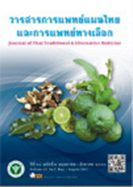Pattern of Health Promotion and Treatment with Thai Traditional Medicine of People in Health Region 1 (8 Provinces of the Upper North)
Main Article Content
บทคัดย่อ
This research study aimed to compare the levels of knowledge, attitudes, behaviors and needs related to health care and treatment with Thai traditional medicine in health region 1 (8 upper northern provinces) and to propose health promotion and treatment pattern with Thai traditional medicine in the region. The research used a mixed method in quantitative study among 400 respondents selected using the multi-stage sampling method from people living in health region 1; and a questionnaire was used for such data collection. Qualitative data were collected with expert group discussions, from May through November 2016. The results of data analysis showed that, of all respondents, there were more females (64.90%) than males; 36.40% were older than 55 years. Their knowledge was higher than expected; attitudes were highly positive (x = 3.66, SD = 0.42); behaviors were moderate (x = 3.32, SD = 0.60); and needs were high (x = 4.18, SD = 0.64). A comparison of differences in knowledge, attitudes, behaviors, and needs, by demographic variable, showed significant differences in all aspects in many variables, except for income (showing no difference). This basic information led to suggestions about how to promote health care and treatment with Thai traditional medicine, regarding service systems, service providers and basic level. It was suggested that the focus should be on educating and adjusting peopleûs attitudes, and building civic sectorûs networks. In terms of health care promotion and treatment with Thai traditional medicine, a systematic management mechanism should be established consisting of: (1) an analysis to understand the context of the community, state of problems and obstacles in peopleûs perspectives; (2) the development of strategic and action plans using a participatory process with all relevant sectors; (3) the implementation of integrated and standardized plans; and (4) the undertaking of continuous monitoring, evaluation and improvement. The above proposition was developed on the basis of the problems and needs of the people and the community, which is considered to be directly beneficial for developing Thai traditional medicine in the northern region as well as other areas.


